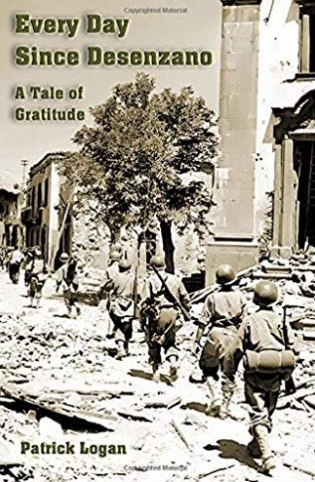It may have been disconnected, random circumstance that led Milton native Patrick Logan to spend years writing a book about his father's wartime experiences slogging through Italy during World War II, but it was a singular, seminal encounter he had on a drizzly evening in Rome that may have revealed to him why he wrote it.
Logan, who graduated from, and later taught at Nute High, bases his father's story on hundreds of letters he'd written to the woman who would be his wife and Logan's mom.
Logan also made several trips to Italy researching for the book, but it was one chance meeting on his first trip when he met an elderly gentleman on the back streets of Rome that will be forever etched in his mind.
 |
| Patrick Logan |
"We spend our first evening in the city wandering the streets through a raw drizzle, searching for a street I have only read about," Logan said. "We pause at the intersection with Via Rasella, where the harsh glare from a streetlight reveals evidence of Rome's resistance to the German occupation. The oblique light creates fist-sized shadows in holes scattered across the facade of a rust-colored building."
Logan explained the back story of those holes. It seemed that war-weary Italians, impatient for the inevitable Allied liberation and eager to make their own contribution to the war effort, used a homemade bomb, grenades and gunfire to attack a column of SS police there, killing 33. The next day Hitler demanded revenge and 335 male citizens of Rome were rounded up, taken to nearby caves and executed in groups of five.
"Reaching for my camera, I frame the pockmarked wall and shoot, the flash catching the attention of an elderly man walking toward us," Logan writes. "He approaches and asks in Italian, 'Via Rasella, you know?'
"I reply with a phrase carefully memorized for the trip, 'Si, mio padre era un soldato Americano nella seconda guerra mondiale,' which means 'Yes, my father was an American soldier in the Second World War.'
"He listens, nodding, and continues, 'Mio padre è morto ... dai soldati Tadeschi,' which means, 'My father was killed ... by German soldiers.'
"Using the thumb and forefinger of each hand, he makes a machine gun, and says, 'Rat-tat-tat-tat-tat.'"
The experience had a profound effect on both Logan and his wife, Rita Hickey, who is from Sanbornville and helped spur Logan to complete the homage to his dad.
Logan graduated from Nute High School in 1975 and later taught junior high and high school English there from 1982-1984 before leaving for Thailand to work in the Peace Corps.
Since then he has spent most of his time in Southeast Asia living in Thailand, Japan and for the past 20 years Singapore where he teaches at James Cook University.
The genesis of the book came clear when his father, Charles Logan, died in 1997 leaving his son all the letters he'd sent to his mom, at least one every single day of the war.
"Soon after, I moved to Singapore, where I got the idea to write about my relationship with my father. I became interested in his 88th Division," Logan said. "Reading his letters (which were dated) and understanding the actions of his division gave me a good idea of his whereabouts during his nearly two years in Italy."
Logan then retraced much of his father's journey through Italy to give him understanding as he wrote the book.
"My father was a storyteller. For most of my life, I listened," Logan reflected in an email sent last week. "However, I thought that I would someday have something to say."
Logan said his book began as a chronicle of his father's travels through war-torn Italy but it grew into something he hadn't expected.
"What began as a father/son story evolved into something larger. My father's letters, the books I'd read about his division, and the people I met gave me a better understanding and appreciation of the sacrifices made not only by those who had served but by those who had waited," he said. "To all of this, I added my own observations from my experiences abroad. Spending so much time in Asia had also reminded me of my good fortune, and how lucky most Americans have been. The result was the book's main theme: gratitude."
Every Day Since Desenzano: A Tale of Gratitude is available on Amazon. To check it out click here.














